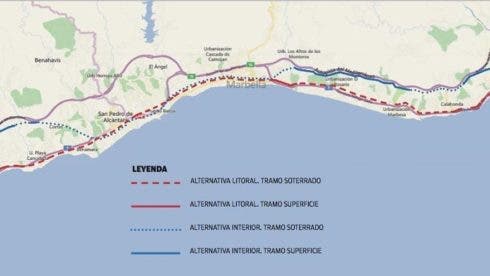THE latest pronouncements from Madrid do not augur well for the long-demanded Costa del Sol train.
Coming on the back of previous tepid and evasive responses from government officials, Transport Minister Oscar Puente called the idea ‘complicated and expensive.’
The minister, who recently published a ‘black list’ of one hundred media outlets which have ‘insulted’ him, made the startling admission that there are ‘no feasibility studies or environmental impact declarations.’
This is in spite of €600,000 believed to have been spent in the last five years on exactly that – feasibility studies on a costa train.
Government ministers have until now refused to answer questions in parliament on the outcomes of these proposals, with Malaga politicians accusing them of ‘hiding them in a drawer.’
Puente outlined two ‘problems’ with building a train line between Malaga and Marbella – not to mention extending it to Estepona and Algeciras.
The first one would be his fear that extending the current train line which finishes at Fuengirola would be slow and ‘uncompetitive’, with many people still preferring to get in their cars.
“If the train stops in 20 places it is not competitive and in the end people will end up doing the same thing they do at the minute, which is going by car to get closer to Malaga to take the AVE (long distance train),” he stated.
The second is not just the topography of the terrain the train line would be built on but also the huge economic value of Costa del Sol real estate.
“If you draw a line on a map it looks very straight forward, but the problem is the topography, as well as the economic and environmental conditions that hold on a line of this type.”
“No one is planning a solution of this type due to the huge costs and environmental obstacles,” he added.
While the transport minister was keen to stress that the government was indeed studying various proposals to ease the mobility problems on the Costa del Sol, he concluded that ‘it seems complicated to me to make a bet on a solution at least within a reasonable period of time.’
The government’s obvious lack of will to offer solutions to long-suffering Costa del Sol residents raised the ire of politicians in Andalucia.
Rocío Díaz, housing and development minister in the Junta, hit back at complaints about the proposed train line’s costs, arguing that it has ‘guarantees of success’ given its dire economic need.
“It would be interesting if, before dismissing projects, [Puente] analysed all the proposals on the table,” she claimed.
“It is a project with strong socio-economic and environmental viability, not only because of the potential demand but also due to the gridlock on the roads running along the Costa del Sol.”

“We should sit down together and talk and assess the need for a train that extends to Marbella – or even as far as Algeciras, or at least to see about extending the Malaga to Fuengirola train.”
Francisco Salado, president of the Malaga Province Council, complained that ‘the Government has already clearly demonstrated that it has no will to build the train to Marbella , Estepona and Algeciras or to solve the mobility problems on the Costa del Sol.’
“The residents of the Costa del Sol are not second class citizens and deserve the same mobility and transport infrastructures that exist, are planned and built in the other large metropolitan areas of Spain,” he fumed.
He admitted the plans would be ‘expensive’ but dismissed it as an argument against because projects of a similar cost had been undertaken in other parts of the country.
“We cannot permit this constant disrespect when Malaga is one of the most dynamic and up-and-coming provinces in the country.”

